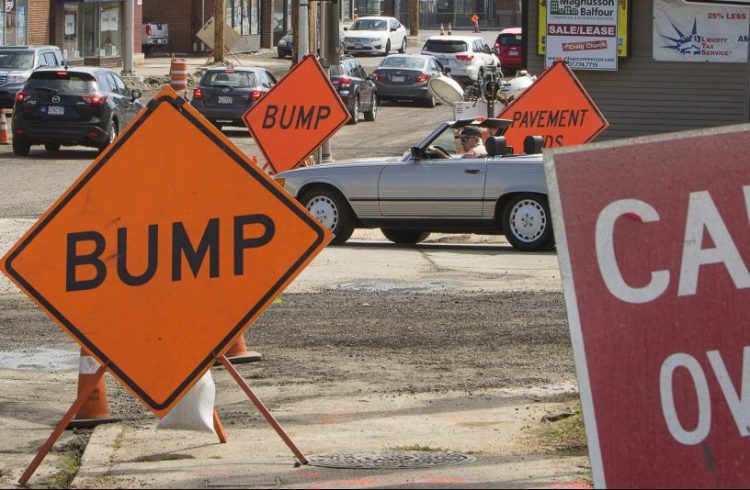If you feel like Maine voters are always being asked to fund roads, bridges and other infrastructure, yet things don’t appear to be getting much better, you’re not crazy. Even with the $136 million provided through Questions 2 and 3 on the statewide ballot Nov. 6, Maine will remain far behind on maintenance.
That’s a problem with funding – caused by priorities and how the state raises money – that must be solved. Until then, however, the bonds will have to do, and the projects that would be undertaken through the two ballot questions are worthy and necessary, if not anywhere near comprehensive. That’s why the Editorial Board endorses a “yes” vote on Questions 2 and 3.
QUESTION 2
Question 2 would provide $30 million to improve sewage systems, leveraging tens of millions of dollars in federal funding. Most of the money would be issued as grants to design and build wastewater treatment plants, with priority given to places where malfunctioning systems are causing contamination from runoff.
Another $2 million would help replace deteriorating septic systems that pollute coastal watersheds, and the remainder would assist homeowners in replacing substandard discharge systems.
That is just a portion of the estimated $1 billion of work necessary in coming years on Maine’s wastewater infrastructure, which was given a D-plus by the American Society of Civil Engineers. “Most communities do not have user rates and fees that are adequate to self-fund their capital needs, causing reliance on federal and state loan and grant funding that historically have not been adequate to cover the known needs in the state,” the group said.
QUESTION 3
There is a gap, too, in funding for Maine’s transportation infrastructure – about $68 million annually between what the state allots and what it should spend just to keep roads up to date.
A big reason for that is the failure to raise the federal and state gasoline tax. The federal gas tax is 18.4 cents per gallon, where it has been since 1993. Maine’s gas tax is 30 cents per gallon (31 for diesel) and has not been increased since 2011. Both are a fraction of what they were at the time when most of the roads and bridges that we use were built – adjusted for inflation from 1959, the federal gas tax would be 34 cents per gallon today; adjusted from 1932, Maine’s gas tax would be 87 cents.
In recent years, voters have approved annual $100 million transportation bonds, of which Question 3 is the latest. It means some roads, bridges and ports get the work they need, but only enough to keep from falling further behind. The American Society of Civil Engineers, which gave Maine roads a D, put it this way: “Maine roads are the most used mode of transportation in the state, but Maine has the lowest funding per mile of the six New England states.”
The bulk of Question 3 – $80 million – would go toward road and bridge construction; $20 million would go to ports, harbors, airports, railroads, public transit, and bicycle and pedestrian trails; $5 million would be set aside for municipal culverts; and $1 million would help improve a pier at Maine Maritime Academy in Castine. Just as with Question 2, the funding would leverage federal money as well.
UNWISE METHOD OF FUNDING
The bonds come at a time of low interest rates and a rolling economy. However, it is not wise to borrow for ongoing expenses – it costs more and leads to trouble when the economy contracts.
Maine should look for ways to change the way it funds infrastructure improvements. With roads, drivers should be asked to contribute the same amount their grandparents did when the roads we use today were first built.
But until then, the bonds are what we have, and they deserve your vote.
Send questions/comments to the editors.


